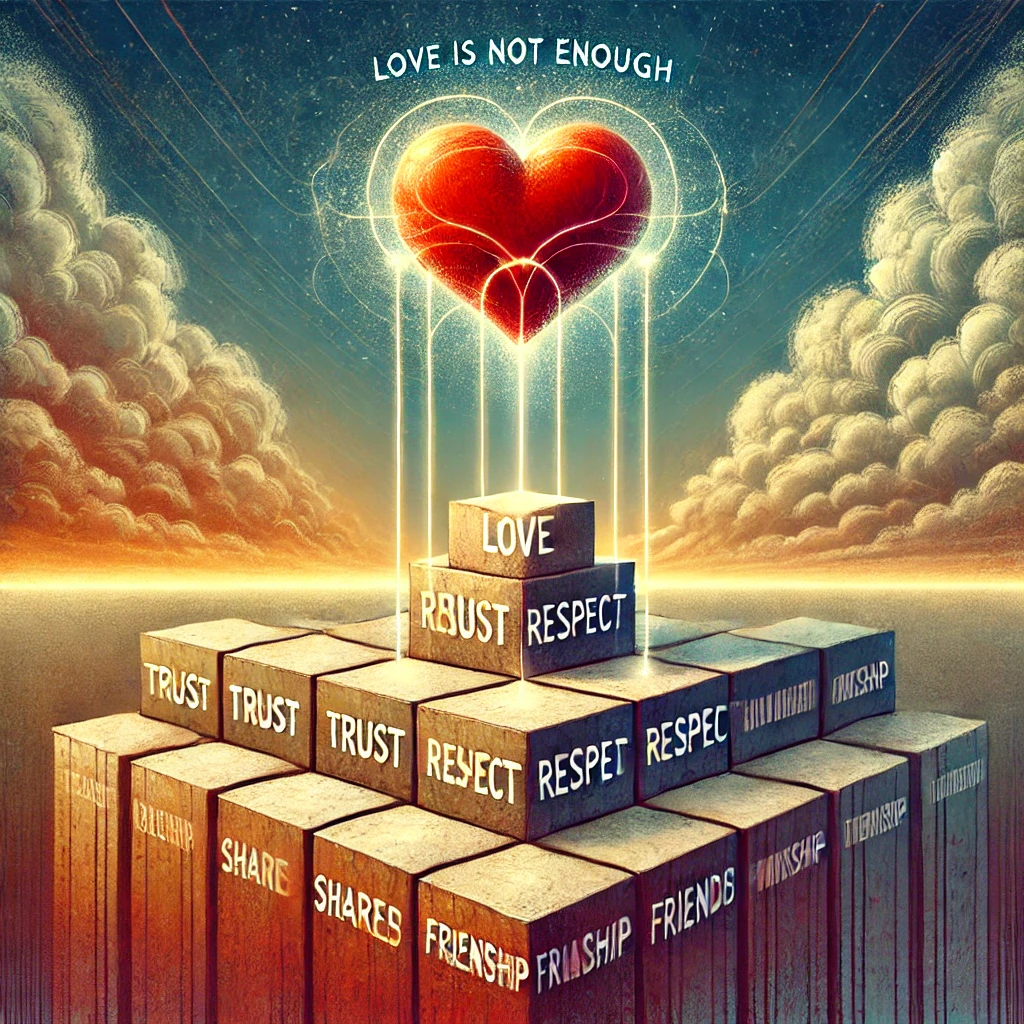
Love Is Not Enough: Why You Need More Than Just Feelings in Relationships
Love is often celebrated as the ultimate connection between two people—a magical force capable of overcoming all obstacles. This portrayal, perpetuated by movies, literature, and cultural narratives, creates a romanticized ideal that can overshadow the complex reality of relationships. While love is vital, it is rarely sufficient on its own to sustain a healthy and fulfilling partnership. Relationships require more than just feelings; they demand shared values, mutual respect, and trust.
This article explores why love, despite its allure, is not the sole ingredient for a lasting relationship. It also highlights the critical elements needed to build a strong foundation for a partnership that thrives beyond fleeting emotions.
The Allure of Idealized Love
From fairytales to modern romantic films, love is often portrayed as the solution to life’s challenges. It is depicted as a cure-all, the ultimate goal in human relationships, and the one force that can conquer all. This idealized view can be captivating but also misleading. It fosters the belief that love alone is enough, leading people to neglect other essential aspects of a partnership.
The stark contrast between outward appearances and inner realities highlights this misconception. Some individuals who famously champion love as the highest virtue have personal lives marked by dysfunction and conflict. Meanwhile, others who might not fit the conventional image of romantic perfection build their relationships on commitment, respect, and mutual support. This contrast reveals a profound truth: love is an important ingredient, but it is not the sole foundation of a healthy and enduring relationship.
The Hard Truths About Love
The romanticized ideal of love often obscures its limitations. Recognizing these truths can help us approach relationships with greater clarity and intention.
1. Love Does Not Equal Compatibility
It’s possible to fall deeply in love with someone who is fundamentally incompatible with you. Love is an emotion, not a guarantee of shared values or long-term alignment. You can feel strong affection for someone who has conflicting life goals, different worldviews, or an inability to meet your emotional needs. Compatibility requires more than chemistry; it demands alignment in values, lifestyle, and communication styles.
2. Love Does Not Solve Relationship Problems
While love can make problems feel less significant in the short term, it does not address their root causes. In some cases, love may even exacerbate issues by creating a false sense of security, allowing couples to avoid confronting underlying conflicts. Relationships built on love but lacking practical foundations—such as trust, respect, and emotional maturity—are unlikely to withstand the challenges of daily life.
3. Love Is Not Worth Sacrificing Yourself For
Compromise is a natural part of any relationship, but it should never come at the expense of your identity, self-respect, or well-being. A healthy relationship should enhance your life, not diminish it. Tolerating disrespectful or harmful behavior in the name of love is not noble; it is destructive. True love supports growth and self-respect, encouraging each partner to be their best self.
Beyond Love: Building a Strong Relationship Foundation
While love can bring joy and connection, it must be accompanied by other critical elements to create a sustainable and meaningful relationship:
1. Shared Values
Shared values provide a roadmap for navigating life’s complexities together. They create a common framework for decision-making, conflict resolution, and setting priorities as a couple. Partners who align on core beliefs are better equipped to face challenges and make meaningful progress as a team.
2. Trust
Trust is the cornerstone of emotional safety. It is built over time through honesty, consistency, and open communication. A relationship without trust is vulnerable to doubt and insecurity, undermining its foundation.
3. Respect
Mutual respect ensures that both partners feel valued and heard. Respect involves treating each other with kindness, empathy, and consideration, even during disagreements. It fosters a sense of equality and partnership, creating a healthy dynamic.
4. Friendship
A strong friendship within a romantic relationship provides stability and resilience. Friendship allows couples to enjoy each other’s company, support each other through challenges, and maintain connection beyond romantic passion.
Prioritizing Your Well-being
Love should enhance your life, not consume it. A relationship rooted in respect, shared values, and trust should support your individuality and well-being. Before committing to a partnership, ask yourself the following:
- Does my partner respect and support me?
- Do we share similar goals and values?
- Can I be my authentic self in this relationship?
While love is a universal experience, what makes a relationship truly exceptional is the presence of trust, respect, and compatibility. Your self-respect and emotional health are irreplaceable; never sacrifice them for the illusion of love.
Conclusion: Building Beyond Love
Love is a powerful and beautiful emotion, but it is not the sole foundation of a fulfilling relationship. A strong, enduring partnership requires intention, shared values, mutual respect, and trust. Love alone cannot sustain a relationship through life’s inevitable challenges, but when paired with these essential elements, it can thrive and grow.
Approach relationships with both your heart and your mind. Let love be a source of joy and inspiration, but build your connection on a foundation of compatibility and mutual respect. In doing so, you ensure that your relationships not only survive but flourish.
